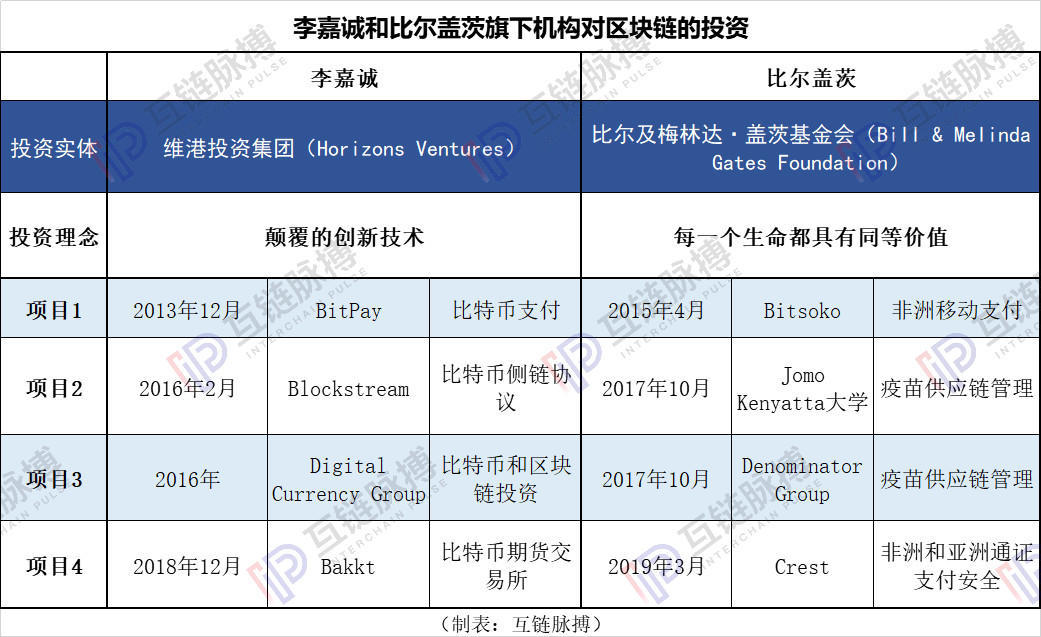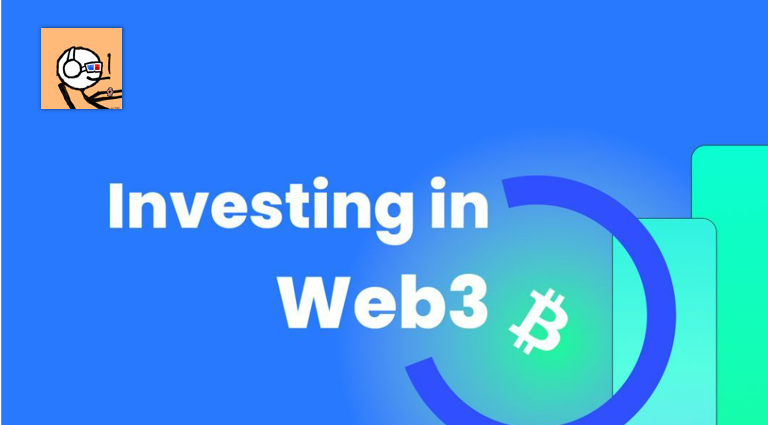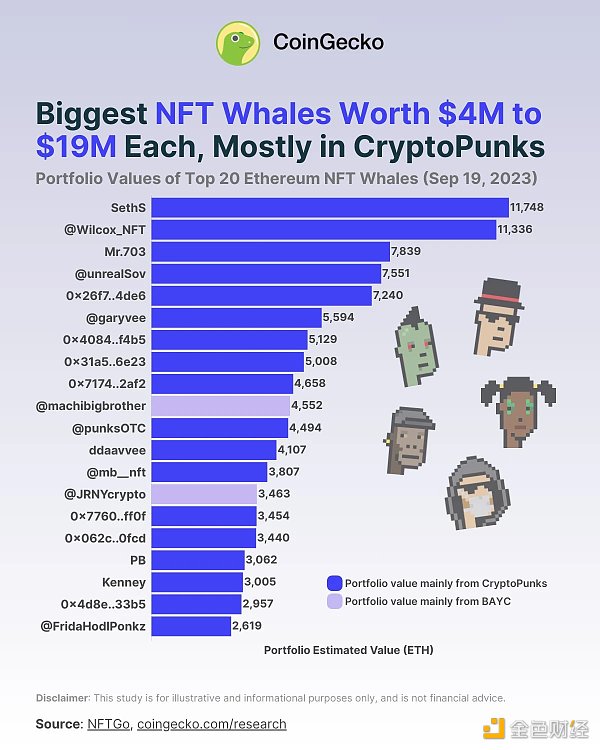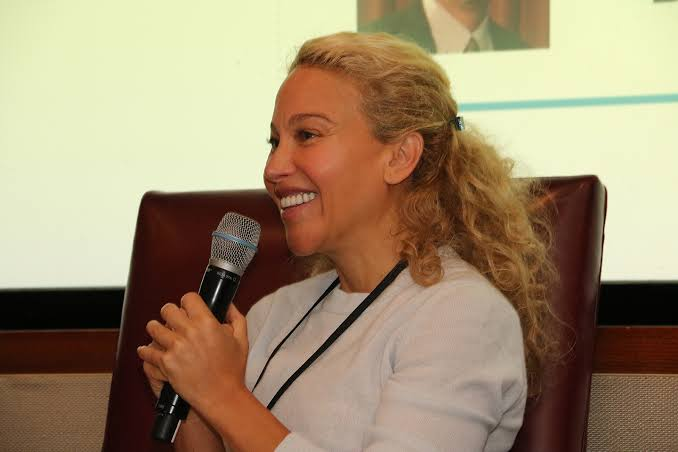Gates and Li Ka-shing's blockchain business: one in the chain and one in the currency
Wen | Interlink Pulse · Yuan Shang
On March 13, Bill Gates, the founder of Microsoft Corporation, announced that he would withdraw from the company's board of directors. At the same time, he quit his position on the board of Berkshire Hathaway, an investment company of Buffett, and will devote more time to charity. Its main operating body is The Bill & Melinda Gates Foundation.
Also in March, two years ago, on March 16, Li Ka-shing officially announced his retirement, but he had also run the Li Ka-shing Foundation after he had reached the age of 90.
With the global epidemic raging, the Bill and Melinda Gates Foundation donated US $ 150 million to fight the epidemic; the Li Ka Shing Foundation donated 100 million to help Wuhan fight the epidemic.
- Let's talk about DAO from a human perspective
- Dialogue | The epidemic connects everyone more closely to the digital world blockchain makes it more credible
- You "don't need" DAO: What is the necessity of DAO?
In addition to fighting the epidemic, the two also made similar shots on the blockchain, but with very different styles.
Double Dragon Dance Chain
Bill Gates and Li Ka-shing, the former richest man in the world and the richest man in the former Asia, each have their own logic for blockchain investment.
Bill Gates currently has two funds. One is Larson's trust fund, the Waterfall Fund, which is responsible for making money. The other charity fund, the Bill and Melinda Gates Foundation, is responsible for spending money. .
Li Ka-shing also has two private funds. One is the Horizons Venture founded by Li Ka-shing's confidant Zhou Kaixuan and is responsible for making money; the Li Ka-shing Foundation is responsible for spending money.
However, in the investment of blockchain, Bill Gates' investment subject is the Melinda Gates Foundation, while Li Ka-shing's investment subject is the Victoria Harbour Fund. The difference in investment subjects also directly affects the direction of investment.
The Victoria Harbour Fund's investment philosophy is to implement disruptive innovations in new technologies, such as investing in Facebook, Skype, Spotify, siri, and DeepMind, which produces Alpha Go. It is also because of this concept that Victoria Harbour Investment has entered the blockchain project very early.
In 2013, in December 2013, Horizons Ventures invested in Bitcoin payment company BitPay. By May 2014, the South China Morning Post reported that Li Ka-shing continued to invest in BitPay through Victoria Harbour Investment. The article stated, “New The total investment increase has not been made public, but the outside world believes that it will reach over 100 million ports. "
BitPay has always been called PayPal on Bitcoin. It is a payment solution for Bitcoin merchants. The merchant receives the consumer's Bitcoin (must be an individual consumer using Bitcoin), and converts the money into his own currency through BitPay. Paying 0.99% as a commission is a profitable project.
Since then, in February 2016, Victoria Harbor invested in Blockstream, a project that aims to expand the functions of the Bitcoin protocol layer company and lead the research and development of the side chain expansion mechanism to connect the Bitcoin blockchain with other blockchain tokens.
In 2016, Victoria Harbour invested in Digital Currency Group (DCG), a company that invests in blockchain and cryptocurrencies.
Public information shows that on December 31, the last day of 2018, the crypto trading platform Bakkt completed the first round of financing of US $ 182.5 million, among which investors included Victoria Harbour Investment.
Overall, the blockchain invested by Victoria Harbour revolves around "Bitcoin".
Part of the funds in the Bill and Melinda Gates Foundation comes from Buffett, who does not like Bitcoin. Bill Gates himself has a good personal relationship with Buffett, and has won the true value of "value investment." The foundation ’s philosophy is A life is of equal value. The foundation will naturally not fund projects related to investing in "Bitcoin."
According to the Melinda Gates Foundation, its earliest investment in blockchain was the Bitsoko project in Ghana, and the foundation donated $ 100,000 to the project. The project hopes to achieve mobile payment in the African region through the blockchain and reduce payment costs. However, the project's official website cannot be opened, and it is likely to have failed.
In October 2017, the Bill and Melinda Gates Foundation donated two similar blockchain projects at the same time, one is the "Jomo Kenyatta University of Agriculture and Technology" and the other is the Denominator Group. Both projects I hope to improve the supply chain management of vaccines through the blockchain, but the focus is different. The Denominator Group focuses on the management of vaccine quality; project records and monitoring at the Jomo Kenyatta Agricultural and Technical University include data on health personnel, vaccine suppliers.
The Bill and Melinda Gates Foundation ’s recent investment in blockchain is an investment in blockchain security company Crest in March this year. The investment goal is to improve the cyber security capabilities of African and Asian markets, and to provide services to banks that have not yet obtained them. Of institutions provide digital financial services.

It can be seen from the investment of Victoria Harbour and the blockchain projects that the Bill and Melinda Gates Foundation have invested in. The former focuses on the transaction of cryptocurrencies, especially Bitcoin; the latter focuses on how to use blockchain to promote fairness and improve the quality of life. This matches the philosophy and nature of the two main bodies. According to the standards of the Chinese blockchain industry, Li Jiacheng is in the currency circle and Bill Gates is in the chain circle.
Ssangyong Currency
But why not the other way around, such as Li Ka-shing Foundation and Waterfall Fund to invest in blockchain? This may be related to the growth experience of two people.
Li Ka-shing's success comes from traditional industries such as manufacturing, real estate, and commerce. His decision to invest in high-tech fields may come from his son or his confidant Zhou Kaixuan. Li Ka-shing himself did not show approval or disapproval of Bitcoin. He only evaluated: "I am more conservative, not too aggressive, do not touch high-risk things, and do not play virtual things."
Therefore, foundations controlled by Li Jiacheng rarely participate in blockchain investment. Zhou Kaixuan, who is less than 33 years old, has a talent for high-tech investment.
There is a rumor circulating in the market that Li Ka-shing bought bitcoin for 100 million yuan in 2014, but it is actually the content of Victoria Harbour's participation in the two rounds of BitPay financing, not the direct purchase of bitcoin.
Zhou Kaixuan is optimistic about the Bitcoin model. Six years ago, she explained such problems patiently. For example, Zhou Kaixuan said, "I don't want to comment on the prospects of bitcoin, but I personally think that because of the inherent release power of the electronic currency V" currency "system, it is very attractive to users and gives it tenacious stretch. Zhou Kaixuan said, "Bitpay was our earlier investment, which helped us understand the opportunities and dynamics of the electronic currency ecosystem, which is very interesting."
Bill Gates' business investment was entrusted to the Falls Fund, whose helm Michael Larson is also a loyal Buffett believer. Therefore, he will not risk investing in cryptocurrency and other fields. But Bill Gates is a high-tech circle after all, knows what blockchain can do and cannot do, so he supports some blockchain application projects through its foundations, and these projects generally have no commercial purpose.
Bill Gates has repeatedly stated that he does not recognize Bitcoin, as Buffett did. Gates revealed that on his birthday, someone gave him some bitcoin, but then sold it-exactly the same as that of Sun Yuchen sending Buffett bitcoin.
Bill Gates clearly stated that speculation in Bitcoin and other cryptocurrencies is based on "big fool theory." When bitcoin surged in 2018, he said that if there was a way to short bitcoin, he would do it. He believes that to make money, assets need production. But "as an asset class, Bitcoin doesn't produce anything, so it shouldn't be expected to rise. It's a pure 'big fool theory' type of investment." Bill Gates said.
Gates also explained the big fool theory: "Yes, I'm a fool to buy this asset now, but I believe I will find a bigger fool and sell it to more people later. Well, the theory of this The speculative part is feasible, but it is only an investment vehicle. Assets have no intrinsic value. "
The disapproval of Bitcoin did not prevent Gates from approving the blockchain, so he successively funded the application of multiple blockchain projects.
Objectively speaking, Li Jiacheng-Zhou Kaixuan's investment in the field of bitcoin transactions and Bill Gates-Larson's funding for blockchain in the area of inclusive poverty alleviation have played a role in promoting technological development. Of course, with different ideas, the differences between the two teams are also great.
Many years later, we can see that after the two rich men unloaded their armors, they inherited the historical value.
This article is the original [mutual chain pulse], the original link: https://www.hulianmaibo.com/posts/info/40680 , please indicate the source when reproduced!
We will continue to update Blocking; if you have any questions or suggestions, please contact us!
Was this article helpful?
93 out of 132 found this helpful
Related articles
- Industrial Blockchain Weekly Report | The first batch of virtual banks has been internally tested, and the ICT Institute launches a blockchain-based resumption platform
- Under the epidemic, how can blockchain make public welfare easier?
- Dialogue | Community epidemic prevention on the chain, data security can be checked
- What is a block of credit? Speaking from Lightning Loan
- Talking about DAO Governance: "Man Rule" + "Autonomy" —— Evolving Way of DAO Governance
- Review of the DApp ecosystem in 2019-the market trend is highlighted, relying on phenomenal games to survive?
- A road to smart hospitals: regulatory audits made easy






